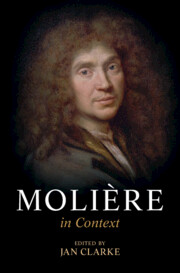Book contents
- Molière in Context
- Molière in Context
- Copyright page
- Dedication
- Contents
- Figures
- Charts and Tables
- Contributors
- Acknowledgements
- Translations
- Abbreviations
- Biographical Preface
- Part I Socio-Political Context
- Part II Intellectual and Artistic Context
- Chapter 7 Philosophical Influences
- Chapter 8 Molière and Classical Theatre
- Chapter 9 The Survival of Medieval and Renaissance Professional Practices
- Chapter 10 Commedia dell’arte
- Chapter 11 The Literary Establishment
- Chapter 12 Are the Précieuses Only Ridicules? Molière, Salon Culture and the Shaping of France’s Collective Memory
- Part III Theatrical Context (Paris)
- Part IV Theatrical Context (Court)
- Part V Reception and Dissemination
- Part VI Afterlives
- Further Reading
- Index
Chapter 11 - The Literary Establishment
from Part II - Intellectual and Artistic Context
Published online by Cambridge University Press: 10 November 2022
- Molière in Context
- Molière in Context
- Copyright page
- Dedication
- Contents
- Figures
- Charts and Tables
- Contributors
- Acknowledgements
- Translations
- Abbreviations
- Biographical Preface
- Part I Socio-Political Context
- Part II Intellectual and Artistic Context
- Chapter 7 Philosophical Influences
- Chapter 8 Molière and Classical Theatre
- Chapter 9 The Survival of Medieval and Renaissance Professional Practices
- Chapter 10 Commedia dell’arte
- Chapter 11 The Literary Establishment
- Chapter 12 Are the Précieuses Only Ridicules? Molière, Salon Culture and the Shaping of France’s Collective Memory
- Part III Theatrical Context (Paris)
- Part IV Theatrical Context (Court)
- Part V Reception and Dissemination
- Part VI Afterlives
- Further Reading
- Index
Summary
Molière worked within the context of a powerful literary establishment, with complex systems of rewards and punishments. Sources of financial support were essential for an author and generally sought from patronage or from the church; institutional prestige might be conferred by election to the Académie Française. Patronage, always potentially unreliable, became increasingly dominated by the King and court and entailed considerable obligations, while the church could prove a formidable enemy. Such sources of patronage and prestige were complemented by a dynamic literary scene, in which reputations could be made or lost: through the salons, both the relatively more social and the more specifically scholarly; and through the critics, with again some writing for a more popular readership and some drawn from among the learned scholars. For a dramatist, popular success was a crucial factor. Molière encountered repeated difficulties, from the withdrawal of patronage, the hostility of the church, and attacks by critics and jealous rivals. He surmounted these with extraordinary success, through a unique combination of factors: great popular success in Paris, the breadth of his appeal, the support of the King and court, the admiration of powerful critical voices and, not least, the influential approval of distinguished scholarly commentators.
- Type
- Chapter
- Information
- Molière in Context , pp. 107 - 115Publisher: Cambridge University PressPrint publication year: 2022

